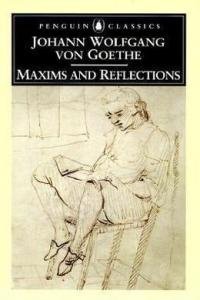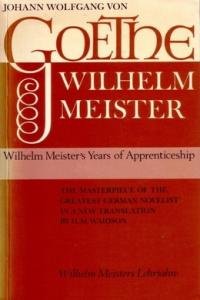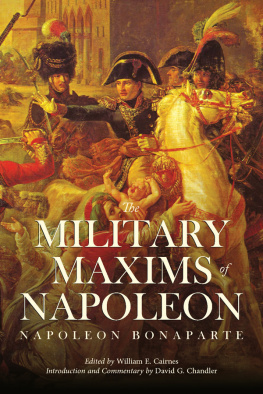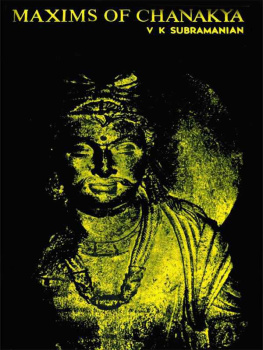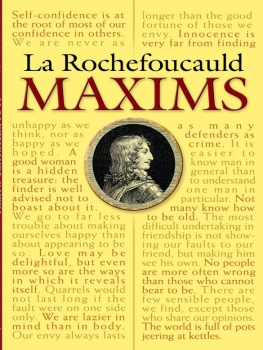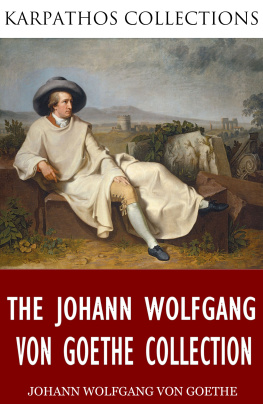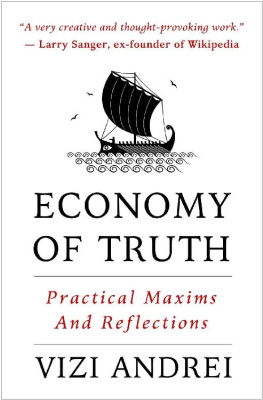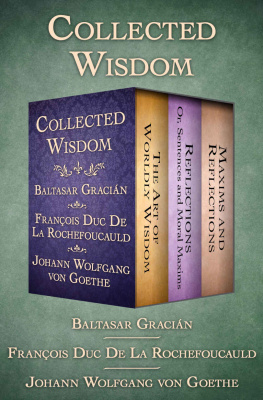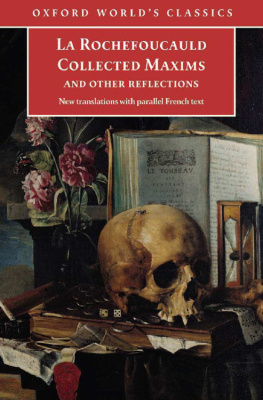Iogann Gete - Maxims and Reflections
Here you can read online Iogann Gete - Maxims and Reflections full text of the book (entire story) in english for free. Download pdf and epub, get meaning, cover and reviews about this ebook. year: 2015, publisher: epubBooks Classics, genre: Non-fiction. Description of the work, (preface) as well as reviews are available. Best literature library LitArk.com created for fans of good reading and offers a wide selection of genres:
Romance novel
Science fiction
Adventure
Detective
Science
History
Home and family
Prose
Art
Politics
Computer
Non-fiction
Religion
Business
Children
Humor
Choose a favorite category and find really read worthwhile books. Enjoy immersion in the world of imagination, feel the emotions of the characters or learn something new for yourself, make an fascinating discovery.
- Book:Maxims and Reflections
- Author:
- Publisher:epubBooks Classics
- Genre:
- Year:2015
- Rating:3 / 5
- Favourites:Add to favourites
- Your mark:
- 60
- 1
- 2
- 3
- 4
- 5
Maxims and Reflections: summary, description and annotation
We offer to read an annotation, description, summary or preface (depends on what the author of the book "Maxims and Reflections" wrote himself). If you haven't found the necessary information about the book — write in the comments, we will try to find it.
Maxims and Reflections — read online for free the complete book (whole text) full work
Below is the text of the book, divided by pages. System saving the place of the last page read, allows you to conveniently read the book "Maxims and Reflections" online for free, without having to search again every time where you left off. Put a bookmark, and you can go to the page where you finished reading at any time.
Font size:
Interval:
Bookmark:
Maxims and Reflections
Johann Wolfgang von Goethe
Translator's Preface
I
The translation of Goethe's "Prose Maxims" now offered to the public is the first attempt that has yet been made to present the greater part of these incomparable sayings in English. In the complete collection they are over a thousand in number, and not more perhaps than a hundred and fifty have already found their way into our language, whether as contributions to magazines here and in America, or in volumes of miscellaneous extract from Goethe's writings. Some are at times quoted as though they were common literary property. To say that they are important as a whole would be a feeble tribute to a work eloquent for itself, and beyond the need of praise; but so deep is the wisdom of these maxims, so wide their reach, so compact a product are they of Goethe's wonderful genius, that it is something of a reproach to literature to find the most of them left untranslated for the sixty years they have been before the world. From one point of view, the neglect they have suffered is in no way surprising: they are too high and severe to be popular so soon; and when they meet with a wide acceptance as with other great works, much of it will rest upon authority. But even for the deeper side of his writings, Goethe has not been denied a fair measure of popular success. No other author of the last two centuries holds so high a place, or, as an inevitable consequence, has been attacked by so large an army of editors and commentators; and it might well be supposed by now that no corner of his work, and least of all one of the best, had remained almost unnoticed, and to the majority unknown. Many of these maxims were early translated into French, but with little success; and even in Germany it was only so late as the year 1870 that they appeared in a separate form, with the addition of some sort of critical comment and a brief explanation of their origin and history.
But although to what is called the reading public these maxims are as yet, no less in fact than in metaphor, a closed book, its pages have long been a source of profit and delight to some of those who are best able to estimate their value. What that value is, I shall presently endeavour to explain. No one, I think, can perceive their worth without also discerning how nearly they touch the needs of our own day, and how greatly they may help us in facing certain problems of life and conduct, some of them, in truth, as old as the world itself, which appear to us now with peculiar force and subtlety.
It was in this respect that they were warmly recommended to me some years ago by my excellent friend, Professor Harnack, the historian of Dogma, a writer with a fine and prudent enthusiasm for all ennobling literature. It is to him that I owe the resolve to perform for the maxims, as far as I could, the office of translator; a humble office, but not, as I have good reason to know, without its difficulty, or, as I venture to hope, without its use. Of many of them the language is hardly lucid even to a German, and I have gratefully to acknowledge the assistance I have received from the privilege of discussing them with so distinguished a man of letters.
To Professor Huxley I am also deeply indebted. I owe him much for friendly encouragement, and still more for help of an altogether invaluable kind; for in its measure of knowledge and skill, it is admittedly beyond the power of any other living Englishman. The maxims deal, not alone with Life and Character, where most of them are admirable, but also with certain aspects of Science and Art; and these are matters in which I could exercise no judgment myself, although I understood that, while many of the maxims on Science and Art were attractive, they were not all of great merit. Professor Huxley not only did me the honour to select the maxims on Science, but he was further good enough to assist me with them, and to read and approve the translation as it now stands. The weight and the interest of his authority will thus give additional value to that section of the book, and also do much to overcome the objections that exist to making a selection at all.
For a selection is a necessary evil. It is an evil because, even if it leaves the best, it takes away something of a man's work; if it shows us the heights he has reached, it obliterates the steps of his ascent; it endangers thoughts that may be important but imperfectly understood; and it hinders a fair and complete judgment. But in the end it is a necessity: we are concerned chiefly with the best and clearest results, and it is only the few who care to follow the elaborate details of effort and progress, often painful and obscure. There is no author with whom, for most readers, selection is so necessary as it is with Goethe; and in no other kind of literature is it so amply justified or so clearly desirable as where the aim is to state broad truths of life and conduct and method in a manner admitting of no mistake or uncertainty. When a writer attempts achievements, as Goethe did, in almost every field of thought, it need be no surprise to any one who has heard of human fallibility that in solid results he is not equally successful everywhere. In deciding what shall be omitted, there is no difficulty with maxims which time has shown to be wrong or defective; they have only an historical interest. But great care is necessary with others that are tentative, questionable, or obscure enough to need the light of a commentary, sometimes dubious; where for most of us there is never much profit and always occasion for stumbling. I count it a singular piece of good fortune that the choice of the scientific maxims should be undertaken by so eminent a judge of their practical value, who is also a scholar in the language and a great admirer of Goethe in his other and better known productions. For if a writer of this immense versatility cannot always hope to touch the highest goal, it is well that all his efforts should be weighed in a later day by the best and friendliest knowledge.
The maxims on Art were at first a matter of some little difficulty. It is plain, I think, that they are below the others in value and interest; and in any collection of sayings the less there is of general worth, the more delicate becomes the task of choosing the best. If I omitted them all, the selection would not be duly representative, and it seemed likely that some at least were worthy of being preserved, if only to illustrate Goethe's theories. I therefore sought the best advice; and here again I have to tender my thanks for assistance second to none in skill and authority,that of Sir Frederick Leighton, kindly given under circumstances which much increase my obligation. For it is my duty to say that Sir Frederick Leighton had no desire, but rather reluctance, to make a selection from maxims on Art which he was often not prepared to endorse, or to regard as in any way commensurate with Goethe's genius; and nevertheless he did me the honour to point out a few which I might insert, as being of interest partly for their own sake, partly also for the name of their author.
The maxims on Science and Art are, however, when taken together, hardly a fifth of this volume. The others I have selected on the simple and I hope blameless principle of omitting only what is clearly unimportant, antiquated, of past or passing interest, of purely personal reference, or of a nature too abstruse to stand without notes of explanation, which I should be sorry to place at the foot of any of these pages. I have also omitted eleven maxims drawn from Hippocrates On Diet; fifteen containing an appreciation of Sterne, together with some twenty more which Goethe himself translated from a curious work wrongly attributed to that writer. It will be convenient if I state that I have thus omitted some hundred and twenty out of the six hundred and fiftyfive which make up the section styled in the original
Font size:
Interval:
Bookmark:
Similar books «Maxims and Reflections»
Look at similar books to Maxims and Reflections. We have selected literature similar in name and meaning in the hope of providing readers with more options to find new, interesting, not yet read works.
Discussion, reviews of the book Maxims and Reflections and just readers' own opinions. Leave your comments, write what you think about the work, its meaning or the main characters. Specify what exactly you liked and what you didn't like, and why you think so.

